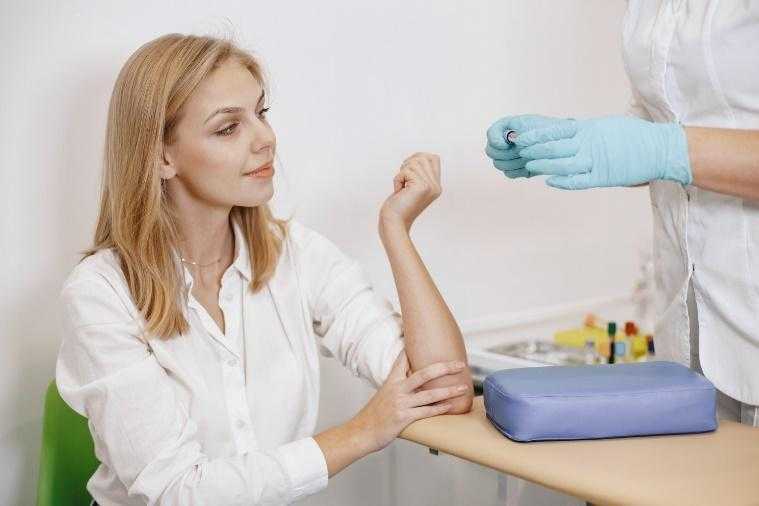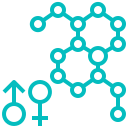Blood Test for Hormone Levels
At HRT Doctors Group, we have partnered with Quest Diagnostic Laboratories to provide accurate and quality lab testing and results for our doctors to use for your assessment. With thousands of Patient Service Centers nationwide and online appointment scheduling, it is easy and convenient to complete your lab.
Once you have completed your comprehensive hormone blood test at the Quest location of your choice, the results will become available within 3 business days. We will notify you of your results and via your HRT Doctors Patient Portal.
After an in-depth consultation with one of our HRT Doctors, it will be determined if hormone replacement therapy is appropriate for you or not.
Please see the attached, sample comprehensive hormone blood test results. You’ll note that we measure hormone values including, but not limited to:
- PROGESTERONE
- ESTRADIOL
- TOTAL TESTOSTERONE
- FREE TESTOSTERONE
- PSA (HRT – Male Patients Only)
- CBC (INCLUDES DIFF/PLT)
- TSH – Thyroid Stimulating Hormone
- WHITE BLOOD CELL COUNT
- RED BLOOD CELL COUNT
- HEMOGLOBIN
- HEMATOCRIT
- MCV
- MCH
- MCHC
- RDW
- PLATELET COUNT
- MPV
- ABSOLUTE NEUTROPHILS
- ABSOLUTE LYMPHOCYTES
- ABSOLUTE MONOCYTES
- ABSOLUTE EOSINOPHILS
- ABSOLUTE BASOPHILS
- NEUTROPHILS
- LYMPHOCYTES
- MONOCYTES
- EOSINOPHILS
- BASOPHILS
The Importance of Blood Lab Results in Establishing a Baseline for Hormone Replacement Therapy
Hormone Replacement Therapy (HRT) and online Testosterone Replacement Therapy (TRT) have emerged as a transformative approach for individuals navigating various life phases and medical conditions. Whether managing menopause symptoms, or addressing other hormone imbalances, HRT and TRT have provided both relief and revitalization to countless individuals. At the foundation of this therapeutic approach lie blood lab results. These results not only ensure the safety and efficacy of treatment but also guide the course of therapy. In this piece, we will delve into the profound significance of blood lab results as they relate to establishing a baseline for Hormone Replacement Therapy.
Understanding Hormone Levels: The Starting Point
Blood lab results reveal a comprehensive picture of an individual’s current hormone levels. By analyzing hormones such as estrogen, testosterone, progesterone, and others in the bloodstream, physicians can discern the existing balance (or imbalance) present. This is vital because everyone has unique hormone levels that fluctuate due to various factors, including age, genetics, and overall health.
Establishing a baseline means understanding where an individual is starting from. Without this information, any intervention would be akin to setting off on a voyage without a map, increasing the risk of unnecessary side effects or inefficiencies in treatment.
Normal hormone level for women and men
|
Hormones |
Normal Levels |
|---|---|
|
FSH |
3-9 mlU/ml |
|
LH |
2-10 mlU/ml |
|
TSH |
0,2-4,7 mlU/ml |
|
Estradiol |
27-161 pg/ml |
|
Progesterone |
5-20 ng/ml (on day 21) |
|
Prolactin |
0-20 ng/ml |
|
AMH |
0,7-3,5 ng/ml |
|
Hormone |
Minimum level |
Maximum level |
|---|---|---|
|
Free testosterone |
90 pg/mg |
300 pg/mg |
|
Total testosterone |
270 ng/dl |
1070 ng/dl |
|
5a-DHT |
30 ng/dl |
85 ng/dl |
|
FSH |
1 mlU/ml |
12 mlU/ml |
|
LH |
2 mlU/ml |
12 mlU/ml |
|
Prolactin |
2,5 ng/ml |
17 ng/ml |
Individualized Treatment Plans
HRT is not a one-size-fits-all solution. The “right” dosage and combination of hormones for one individual may be drastically different for another. Blood lab results facilitate a personalized approach to HRT, ensuring that treatments are tailored to each individual’s unique needs.
With a clear understanding of current hormone levels, physicians can determine the most suitable type, dosage, and delivery method of replacement hormones. As treatment progresses, subsequent blood tests ensure that prescribed dosages remain optimal and adjust as necessary.
Minimizing Side Effects and Risks
Like all medical interventions, HRT comes with potential side effects. However, these can be significantly mitigated by basing treatment decisions on accurate blood lab results. For instance, excessive estrogen without adequate progesterone can lead to endometrial hyperplasia, a condition that increases the risk of endometrial cancer in women. Knowing estrogen and progesterone levels helps avoid such imbalances.
Moreover, certain conditions, like blood clotting disorders, liver diseases, or a history of certain cancers, may be contraindications or require specialized monitoring during HRT. Blood tests help identify any underlying conditions or risks and ensure a safer therapeutic journey.
Monitoring Treatment Efficacy
Beyond the initiation of HRT, periodic blood tests are essential for monitoring the therapy’s ongoing efficacy. Are hormone levels reaching desired therapeutic ranges? Are there any unexpected fluctuations or anomalies? Regular blood tests offer answers to these critical questions and allow for timely adjustments, ensuring that individuals consistently receive the maximum benefits of HRT with minimal risks.
Tracking Other Vital Markers
While the primary focus in HRT is on hormones, it’s essential to understand that our bodies are systems where various components interact. Blood lab results also provide insights into other vital markers, such as liver function, lipid levels, and blood clotting factors. These markers can influence, and be influenced by, hormone levels. By keeping an eye on these markers, physicians can prevent potential complications and ensure that HRT does not adversely affect other aspects of an individual’s health.
Validating Patient Experiences
While objective data from blood lab results are invaluable, so too are the subjective experiences of individuals undergoing HRT. Symptoms like fatigue, hot flashes, mood swings, or other hormone-related manifestations can be validated or better understood in light of blood test results. This provides a more holistic view of a patient’s well-being, merging subjective experiences with objective data.
Conclusion
In the realm of Hormone Replacement Therapy, blood lab results play an indispensable role. They act as navigational tools, guiding clinicians in the initiation, adjustment, and monitoring of treatment. By establishing a clear baseline, these results ensure that HRT is not only effective but also safe, considering the intricate balance and interplay of hormones within the human body.
For individuals considering or undergoing HRT, understanding the importance of these blood tests offers a clearer perspective on their therapeutic journey. It underscores the fact that successful HRT is a blend of science, individualized care, and consistent monitoring, all rooted in the foundational information provided by blood lab results.

TRT & HRT
Are you ready to change your life by regaining your health? There is never a better moment to start managing your health than right NOW.




